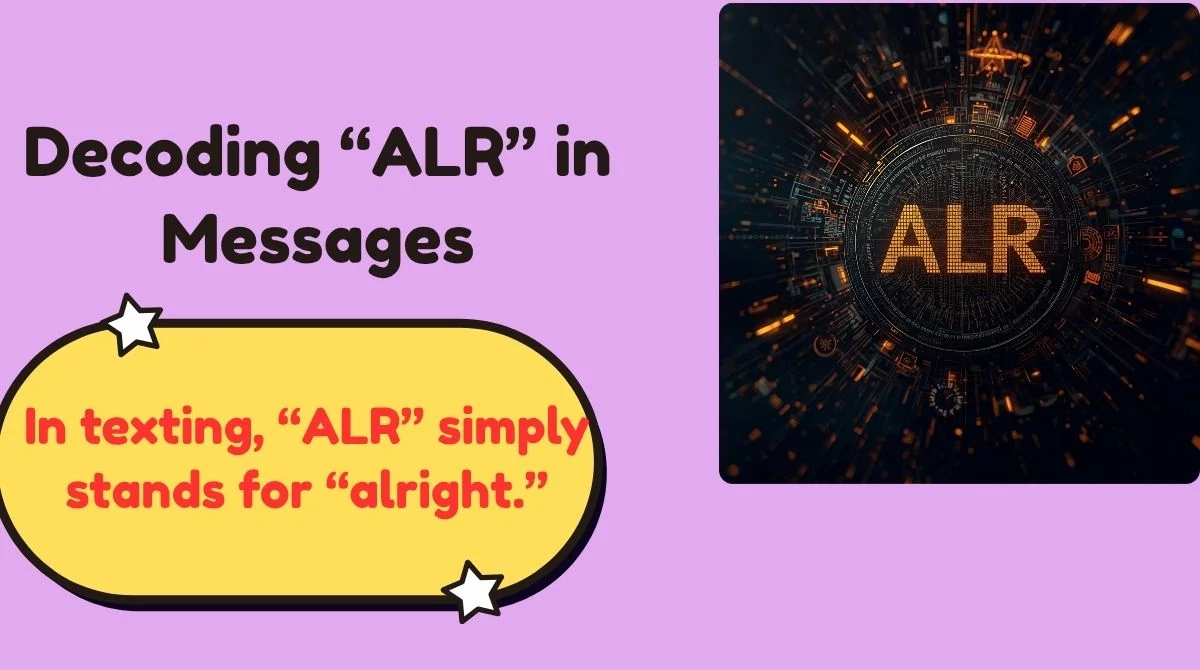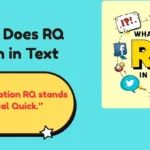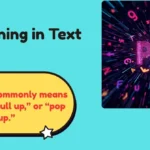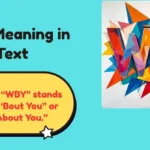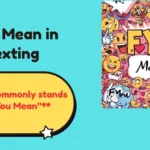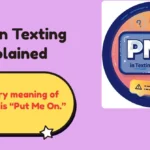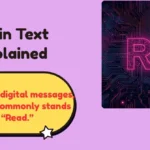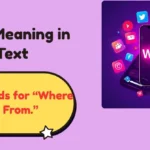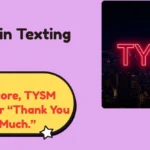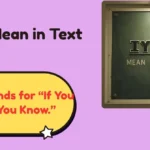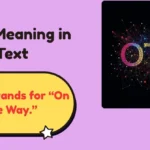Texting has its own language — short, fast, and full of abbreviations. From “LOL” to “BRB,” these acronyms help people communicate quickly. But one abbreviation often leaves people second-guessing its tone: “ALR.”
If you’ve ever received a one-word reply like “ALR” and wondered, “Are they mad at me?”, you’re not alone. In this guide, we’ll break down what ALR means in messages, how it’s used, and when to skip it for something clearer.
By the end, you’ll know exactly how to use it without sounding rude — and which alternatives can make your messages sound more human, warm, and confident.
What Does “ALR” Mean in Text Messages?
In texting, “ALR” simply stands for “alright.” It’s an abbreviation people use to respond quickly, especially in casual chats.
Think of it as a shorthand version of okay or got it. However, context changes everything — sometimes it feels friendly, and other times it comes across as dismissive.
Here’s a quick comparison to help you understand how ALR stacks up against other short replies:
| Term | Meaning | Tone | Example |
|---|---|---|---|
| ALR | Alright | Neutral or casual | “ALR, I’ll be there.” |
| OK | Okay | Neutral | “OK, see you soon.” |
| K | Short for OK | Cold or abrupt | “K.” |
| Alright | Full word | Neutral, warmer | “Alright, sounds good.” |
Example:
- Friend: “Wanna grab food later?”
- You: “ALR, what time?”
Here, it sounds fine — quick and casual. But in another context, say during an argument, “ALR” might sound like you’re brushing someone off.
The Origin and Popularity of “ALR”
“ALR” didn’t appear overnight. It’s part of a natural evolution of online speech. As digital conversations got faster, people started trimming down common words.
- Early 2000s: Internet slang like “LOL” and “BRB” appeared.
- 2010s: Text culture shortened full words — “you” became “u,” “thanks” became “thx.”
- 2020s: Gen Z started abbreviating even more, giving rise to terms like “ALR,” “IG” (I guess), and “FWIW” (for what it’s worth).
Today, you’ll find ALR in texts, TikTok comments, and Discord chats — mostly among younger audiences who value brevity and speed.
How the Tone of “ALR” Changes with Context
Tone can make “ALR” feel warm, neutral, or even cold. It’s all about how and where you use it.
When “ALR” Feels Friendly or Chill
When used casually among friends, ALR works perfectly.
It’s laid-back, informal, and often paired with emojis or follow-up phrases.
Examples:
- “ALR 😎 see u soon!”
- “ALR, no worries haha.”
- “ALR, I’ll text you when I’m done.”
It feels relaxed because the tone carries familiarity. You’re acknowledging the message without overexplaining.
Pro Tip:
Adding an emoji or extra word softens the tone — it signals friendliness rather than indifference.
When “ALR” Sounds Cold or Passive
On the flip side, “ALR” can sound too short. When it’s the only word in a text, it might give off “I don’t care” energy.
Examples that can sound off:
- “ALR.” (with a period)
- “ALR” after a long message
- “ALR” without any emoji or context
Why it happens:
Tone doesn’t translate well through text. So brevity — while efficient — can sometimes feel dismissive.
Case Study:
A college student once shared a story on Reddit about texting their roommate:
“Hey, can you please clean the kitchen?”
Reply: “ALR.”
Even though the roommate meant “Sure,” the sender read it as attitude. That’s the power of perceived tone in short replies.
When “ALR” Appears in Professional Chats
In professional communication — Slack, Teams, or email — ALR can look too informal or lazy.
Example:
- ❌ “ALR, I’ll send it later.”
- ✅ “Understood, I’ll send it later today.”
It’s fine for casual work chats among peers, but never for managers or clients. In those spaces, clarity and professionalism win over speed.
Is “ALR” Polite or Rude? Understanding Its Tone Nuance
The politeness of “ALR” depends entirely on context and relationship.
| Situation | Perception | Example |
|---|---|---|
| Chatting with close friends | Friendly | “ALR, I’ll be there soon 😄” |
| Texting your boss | Unprofessional | “ALR, I’ll do it.” |
| Responding to an argument | Passive-aggressive | “ALR.” |
| Group chat with peers | Neutral | “ALR, gotcha.” |
In short:
- With friends → Fine.
- With strangers or professionals → Risky.
- During tense conversations → Avoid it entirely.
Tone isn’t about the word — it’s about how it feels to the person reading it.
Common Situations Where “ALR” Gets Misread
Texting is fast, but feelings aren’t. “ALR” often gets misinterpreted in these cases:
- Talking to someone new – They don’t know your texting style yet.
- During a disagreement – Short replies sound colder.
- Professional chats – Looks too casual or dismissive.
- Cross-generational texting – Older folks might not even know what “ALR” means.
Example:
Your mom texts: “Are you coming for dinner?”
You reply: “ALR.”
To her, that might read like, “I guess.”
Lesson: When clarity matters more than speed, skip the abbreviation.
Why It’s Better to Use Alternatives in Certain Contexts
Communication isn’t just about words — it’s about how people feel reading them.
If there’s even a small chance of sounding cold or uninterested, use an alternative.
When NOT to use “ALR”:
- During sensitive or emotional conversations.
- In work or client messages.
- When the other person writes long, detailed texts.
Checklist:
✅ Do I know the person well?
✅ Is the chat casual?
✅ Would I say “alright” out loud in this tone?
If you hesitate at any of those — choose a clearer reply.
15 Smarter Alternatives to “ALR” (With Real Examples)
Here’s a list of polished alternatives that sound natural and emotionally balanced.
| Alternative | Meaning/Tone | Example Use |
|---|---|---|
| Understood | Professional & respectful | “Understood, I’ll handle it.” |
| Sounds Good | Friendly agreement | “Sounds good, see you later.” |
| Noted | Formal acknowledgment | “Noted, thank you.” |
| Okay, Perfect | Warm & approving | “Okay, perfect — that works!” |
| Alrighty | Casual & cheerful | “Alrighty, I’m in.” |
| Sure Thing | Confident & friendly | “Sure thing, I’ll take care of it.” |
| Got It | Simple & neutral | “Got it, thanks!” |
| Absolutely | Enthusiastic | “Absolutely, I agree.” |
| Certainly | Polite & professional | “Certainly, I’ll confirm.” |
| Of Course | Supportive & kind | “Of course, no problem.” |
| That Works for Me | Cooperative | “That works for me.” |
| I’m Good with That | Easygoing | “I’m good with that plan.” |
| Okay, Gotcha | Playful confirmation | “Okay, gotcha 😄.” |
| Copy That | Confident acknowledgment | “Copy that, will do.” |
| Roger That | Fun & assertive | “Roger that, captain!” |
Pro Tip:
Match your tone to your relationship. “Roger that” might make your friends laugh, but it’s not for your boss.
How to Choose the Right Alternative Based on Context
Different situations call for different tones. Here’s how to pick the right one.
For Professional Settings
Use words that show clarity and respect.
Examples:
- “Understood.”
- “Noted.”
- “Certainly.”
Scenario:
Manager: “Please send me the file by 2 PM.”
You: “Understood, I’ll have it ready by then.”
Short, clear, and confident.
For Friendly Conversations
Keep it light and warm.
Examples:
- “Sounds good!”
- “Got it.”
- “Alrighty!”
Scenario:
Friend: “Let’s hit the gym later.”
You: “Sounds good, text me the time.”
For Playful or Flirty Chats
Add a touch of humor or energy.
Examples:
- “Okay, gotcha 😉.”
- “Sure thing 😏.”
- “Roger that, boss 😜.”
This tone shows you’re fun and engaged, not dry or robotic.
Why Tone and Context Matter So Much Online
Tone is the soul of a message. In real life, people can hear your voice and see your face. In texts, all they have are your words.
Quick fact: According to a 2023 digital communication survey, 70% of texting misunderstandings come from tone confusion.
Example:
- You say “ALR.”
- They read it as “I’m annoyed.”
- Misunderstanding begins.
Quote:
“Words may be brief, but tone lasts long after the message is read.”
Tip: Add small context clues — punctuation, emojis, or short follow-ups — to show warmth.
Is “ALR” Acceptable in Work Emails or Team Chats?
Short answer: Not really.
In professional spaces, “ALR” sounds too casual and lacks tone clarity.
Why it’s risky:
- It can make you seem dismissive.
- Not everyone knows what it means.
- It lacks professionalism.
Better options:
- “Understood.”
- “Will do.”
- “Got it, thanks.”
Example:
❌ “ALR, I’ll update the file.”
✅ “Got it, I’ll update the file by 3 PM.”
Always err on the side of professionalism — clear, direct, and respectful.
FAQs About “ALR” in Texts
What does ALR mean in a message?
It means “alright.” People use it as a quick acknowledgment or confirmation in casual texts.
Is ALR slang or just shorthand?
It’s shorthand slang — a shortened form of “alright” mostly used by younger texters online.
Is ALR rude?
Not always. It depends on tone and context. Used alone, it might sound dismissive; used with warmth, it’s perfectly fine.
Can I use ALR in professional emails?
Avoid it. Stick to more professional terms like “Understood” or “Noted.”
How do I make ALR sound friendlier?
Add context or emojis — like “ALR 😄” or “ALR, see you soon!” to show positive tone.
Conclusion
Digital communication moves fast — but tone still matters. “ALR” is simple and convenient, yet easily misunderstood.
To master modern texting:
- Use ALR sparingly and only in casual settings.
- Match your tone to your relationship and context.
- When unsure, choose clarity — words like “Got it,” “Sounds good,” or “Understood” always land better.
Communication isn’t just about speed. It’s about connection.
So next time someone texts you, skip the confusion — reply in a way that shows you care.
